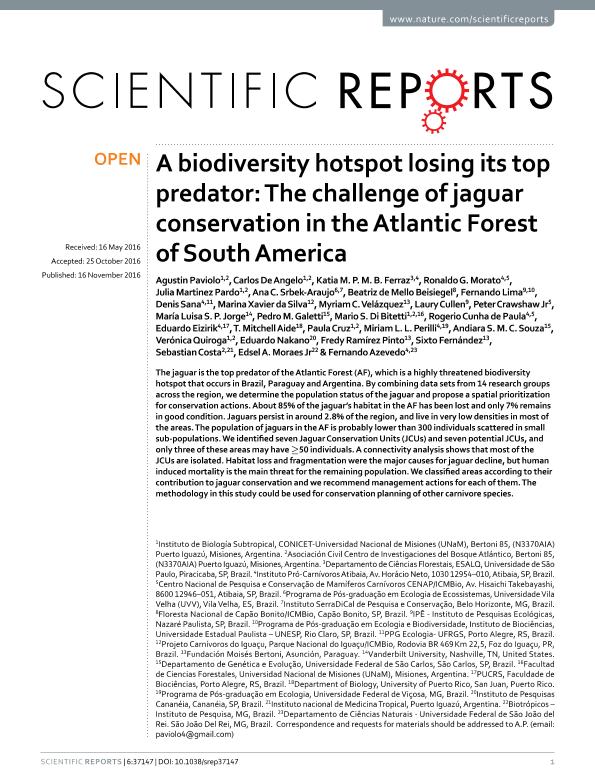Artículo
A biodiversity hotspot losing its top predator: The challenge of jaguar conservation in the Atlantic Forest of South America
Paviolo, Agustin Javier ; de Angelo, Carlos Daniel
; de Angelo, Carlos Daniel ; Ferraz, Katia M. P. M. B.; Morato, Ronaldo G.; Martínez Pardo, Julia
; Ferraz, Katia M. P. M. B.; Morato, Ronaldo G.; Martínez Pardo, Julia ; Srbek Araujo, Ana C.; Beisiegel, Beatriz De Mello; Lima, Fernando; Sana, Denis; Xavier Da Silva, Marina; Velázquez, Myriam C.; Cullen, Laury; Crawshaw, Peter; Jorge, María Luisa S. P.; Galetti, Pedro M.; Di Bitetti, Mario Santiago
; Srbek Araujo, Ana C.; Beisiegel, Beatriz De Mello; Lima, Fernando; Sana, Denis; Xavier Da Silva, Marina; Velázquez, Myriam C.; Cullen, Laury; Crawshaw, Peter; Jorge, María Luisa S. P.; Galetti, Pedro M.; Di Bitetti, Mario Santiago ; De Paula, Rogerio Cunha; Eizirik, Eduardo; Aide, T. Mitchell; Cruz, María Paula
; De Paula, Rogerio Cunha; Eizirik, Eduardo; Aide, T. Mitchell; Cruz, María Paula ; Perilli, Miriam L. L.; Souza, Andiara S. M. C.; Quiroga, Verónica Andrea
; Perilli, Miriam L. L.; Souza, Andiara S. M. C.; Quiroga, Verónica Andrea ; Nakano, Eduardo; Ramírez Pinto, Fredy; Fernández, Sixto; Costa, Sebastián Andrés; Moraes, Edsel A.; Azevedo, Fernando
; Nakano, Eduardo; Ramírez Pinto, Fredy; Fernández, Sixto; Costa, Sebastián Andrés; Moraes, Edsel A.; Azevedo, Fernando
 ; de Angelo, Carlos Daniel
; de Angelo, Carlos Daniel ; Ferraz, Katia M. P. M. B.; Morato, Ronaldo G.; Martínez Pardo, Julia
; Ferraz, Katia M. P. M. B.; Morato, Ronaldo G.; Martínez Pardo, Julia ; Srbek Araujo, Ana C.; Beisiegel, Beatriz De Mello; Lima, Fernando; Sana, Denis; Xavier Da Silva, Marina; Velázquez, Myriam C.; Cullen, Laury; Crawshaw, Peter; Jorge, María Luisa S. P.; Galetti, Pedro M.; Di Bitetti, Mario Santiago
; Srbek Araujo, Ana C.; Beisiegel, Beatriz De Mello; Lima, Fernando; Sana, Denis; Xavier Da Silva, Marina; Velázquez, Myriam C.; Cullen, Laury; Crawshaw, Peter; Jorge, María Luisa S. P.; Galetti, Pedro M.; Di Bitetti, Mario Santiago ; De Paula, Rogerio Cunha; Eizirik, Eduardo; Aide, T. Mitchell; Cruz, María Paula
; De Paula, Rogerio Cunha; Eizirik, Eduardo; Aide, T. Mitchell; Cruz, María Paula ; Perilli, Miriam L. L.; Souza, Andiara S. M. C.; Quiroga, Verónica Andrea
; Perilli, Miriam L. L.; Souza, Andiara S. M. C.; Quiroga, Verónica Andrea ; Nakano, Eduardo; Ramírez Pinto, Fredy; Fernández, Sixto; Costa, Sebastián Andrés; Moraes, Edsel A.; Azevedo, Fernando
; Nakano, Eduardo; Ramírez Pinto, Fredy; Fernández, Sixto; Costa, Sebastián Andrés; Moraes, Edsel A.; Azevedo, Fernando
Fecha de publicación:
11/2016
Editorial:
Nature Publishing Group
Revista:
Scientific Reports
ISSN:
2045-2322
Idioma:
Inglés
Tipo de recurso:
Artículo publicado
Clasificación temática:
Resumen
The jaguar is the top predator of the Atlantic Forest (AF), which is a highly threatened biodiversity hotspot that occurs in Brazil, Paraguay and Argentina. By combining data sets from 14 research groups across the region, we determine the population status of the jaguar and propose a spatial prioritization for conservation actions. About 85% of the jaguar's habitat in the AF has been lost and only 7% remains in good condition. Jaguars persist in around 2.8% of the region, and live in very low densities in most of the areas. The population of jaguars in the AF is probably lower than 300 individuals scattered in small sub-populations. We identified seven Jaguar Conservation Units (JCUs) and seven potential JCUs, and only three of these areas may have ≥50 individuals. A connectivity analysis shows that most of the JCUs are isolated. Habitat loss and fragmentation were the major causes for jaguar decline, but human induced mortality is the main threat for the remaining population. We classified areas according to their contribution to jaguar conservation and we recommend management actions for each of them. The methodology in this study could be used for conservation planning of other carnivore species.
Archivos asociados
Licencia
Identificadores
Colecciones
Articulos(CCT - NORDESTE)
Articulos de CTRO.CIENTIFICO TECNOL.CONICET - NORDESTE
Articulos de CTRO.CIENTIFICO TECNOL.CONICET - NORDESTE
Citación
Paviolo, Agustin Javier; de Angelo, Carlos Daniel; Ferraz, Katia M. P. M. B.; Morato, Ronaldo G.; Martínez Pardo, Julia; et al.; A biodiversity hotspot losing its top predator: The challenge of jaguar conservation in the Atlantic Forest of South America; Nature Publishing Group; Scientific Reports; 6; 11-2016; 1-16
Compartir
Altmétricas



